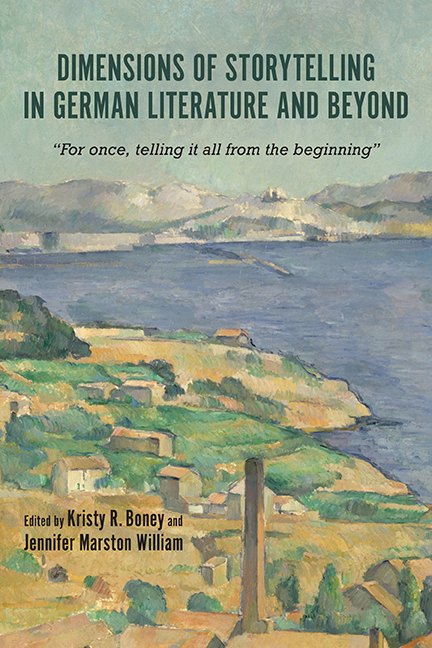 Dimensions of Storytelling in German Literature and Beyond
Dimensions of Storytelling in German Literature and Beyond Book contents
- Frontmatter
- Contents
- Acknowledgments
- Introduction: The Social, Political, and Personal Dimensions of Storytelling
- Part I Anna Seghers: A Missing Piece in the Canon of Modernist Storytellers
- Part II Expressions of Modernity: Using Storytelling Unconventionally
- 8 Storytelling and Telling Stories in Heine's Prose Fiction
- 9 Modernist Haze: Topographical Textures in Paul Klee and Franz Kafka
- 10 Synthesis and Transtextuality: The Jewish Reinvention of Chinese Mythical Stories in “Shanghai Ghetto”
- 11 American Children Writing Yiddish: The Published Anthologies of the Chicago Sholem Aleichem Schools
- 12 A Literary Depiction of the Homeland of Jews in Czechoslovakia and East Germany after 1945
- 13 Changed for the Better? Alternative Uses of the Transformative Cancer Trope in Thomas Mann's Die Betrogene and Nadine Gordimer's Get a Life
- Part III The Personal Narrative: Storytelling in Acute Historical Moments
- Notes on the Contributors
- Index
13 - Changed for the Better? Alternative Uses of the Transformative Cancer Trope in Thomas Mann's Die Betrogene and Nadine Gordimer's Get a Life
from Part II - Expressions of Modernity: Using Storytelling Unconventionally
Published online by Cambridge University Press: 12 April 2019
- Frontmatter
- Contents
- Acknowledgments
- Introduction: The Social, Political, and Personal Dimensions of Storytelling
- Part I Anna Seghers: A Missing Piece in the Canon of Modernist Storytellers
- Part II Expressions of Modernity: Using Storytelling Unconventionally
- 8 Storytelling and Telling Stories in Heine's Prose Fiction
- 9 Modernist Haze: Topographical Textures in Paul Klee and Franz Kafka
- 10 Synthesis and Transtextuality: The Jewish Reinvention of Chinese Mythical Stories in “Shanghai Ghetto”
- 11 American Children Writing Yiddish: The Published Anthologies of the Chicago Sholem Aleichem Schools
- 12 A Literary Depiction of the Homeland of Jews in Czechoslovakia and East Germany after 1945
- 13 Changed for the Better? Alternative Uses of the Transformative Cancer Trope in Thomas Mann's Die Betrogene and Nadine Gordimer's Get a Life
- Part III The Personal Narrative: Storytelling in Acute Historical Moments
- Notes on the Contributors
- Index
Summary
CANCER HAS BEEN A THEME in fictional literary works for centuries, but particularly from the twentieth century on. The prevailing representation has been of cancer serving as an impetus for transformative change in either the cancer patient, a person close to the patient, or both. Cancer patients in works of fiction generally experience their illness, and, where applicable, their recovery, over a longer period of time in comparison to more acute illnesses. This allows the sick characters and those around them to think about their lives, and perhaps to change the way they have been living because of having encountered a potentially terminal illness. Such a storyline is what Arthur Frank refers to in The Wounded Storyteller: Body, Illness and Ethics (1997) as “The Quest Narrative,” in which illness is depicted as a journey that ultimately turns into a pursuit of something such as knowledge or experience. Although not always the dominant depiction of the cancer experience, this portrayal is integral to early fictional cancer works such as Maria Edgeworth's 1801 novel Belinda, and Theodor Storm's 1887 novella Ein Bekenntnis (An Avowal), as well as to more recent texts, such as Margaret Atwood's 1981 novel Bodily Harm and Margaret Edson's 1995 play Wit. The prevailing depiction in early fictional accounts had been of static, familiar character representations of the cancer patient, often consisting of a virtuous dying woman inspiring those around her, and frequently involving cancer of the reproductive tract or breast cancer. In contrast, the emphasis since the mid-twentieth century has largely been to depict a single unique patient as he or she learns from and changes through the cancer experience. In this essay, however, I will examine two texts that present alternative views of the transformative nature of a cancer experience: Thomas Mann's 1953 novella Die Betrogene, and Nadine Gordimer's 2005 novel Get a Life. While Mann's work is essentially an indictment of the very concept through his portrayal of the afflicted protagonist, Gordimer's offers a more nuanced depiction of transformative change than the traditionally dramatic one. Each could be viewed as a reflection of the time in which it was written. Mann's text offers no hint of sympathy or understanding for his protagonist, but rather solely his apparent contempt.
- Type
- Chapter
- Information
- Dimensions of Storytelling in German Literature and Beyond“For once, telling it all from the beginning”, pp. 176 - 186Publisher: Boydell & BrewerPrint publication year: 2018
